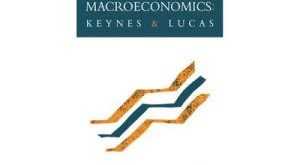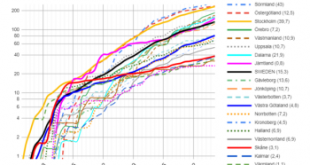Schweden fährt in der Corona-Krise seinen eigenen Kurs [embedded content]
Read More »Pandemic depression antidote (VII)
Pandemic depression antidote (VII) [embedded content] War veteran Tom Moore has won the hearts of people by raising more than £30 million for the NHS by walking laps of his garden. Thanks, Captain Tom!
Read More »Haavelmo and modern probabilistic econometrics — a critical-realist perspective (wonkish)
Haavelmo and modern probabilistic econometrics — a critical-realist perspective (wonkish) Mainstream economists often hold the view that criticisms of econometrics are the conclusions of sadly misinformed and misguided people who dislike and do not understand much of it. This is a gross misapprehension. To be careful and cautious is not equivalent to dislike. The ordinary deductivist ‘textbook approach’ to econometrics views the modelling process as...
Read More »Lucas’ Copernican revolution
In Michel De Vroey’s version of the history of macroeconomics, Robert Lucas’ declaration of the need for macroeconomics to be pursued only within ‘equilibrium discipline’ and declaring equilibrium to exist as a postulate, is hailed as a ‘Copernican revolution.’ Equilibrium is not to be considered something that characterises real economies, but rather “a property of the way we look at things.” De Vroey, approvingly, notices that this — as well as Lucas’ banning of...
Read More »Tom Britton on the mathematics of the corona outbreak
Tom Britton on the mathematics of the corona outbreak [embedded content]
Read More »Causal inference (student stuff)
Causal inference (student stuff) [embedded content]
Read More »Sweden’s coronavirus strategy is starting to yield results
Sweden’s coronavirus strategy is starting to yield results Sweden’s unusual approach to fighting the coronavirus pandemic is starting to yield results, according to the country’s top epidemiologist. Dr Anders Tegnell, the architect behind Sweden’s relatively relaxed response to Covid-19, told local media the latest figures on infection rates and fatalities indicate the situation is starting to stabilise. “We’re on a sort of plateau,” Dr Tegnell told Swedish...
Read More »MMT and corona policy measures
MMT and corona policy measures Many commentators seem to view MMT as merely a blueprint for turning on the printing press … These commentators have it all wrong. MMT does not support quantitative easing (QE), nor does it prescribe “helicopter drops,” for the simple reason that there is no such thing as a “helicopter-money” alternative to financing a fiscal-stimulus package. Instead, what MMT does is describe how a government that issues its own currency...
Read More »Bab’ Azîz
[embedded content]
Read More »Read my lips — using an RCT guarantees nothing!
Read my lips — using an RCT guarantees nothing! The claimed hierarchy of methods, with randomized assignment being deemed inherently superior to observational studies, does not survive close scrutiny. Despite frequent claims to the contrary, an RCT does not equate counterfactual outcomes between treated and control units. The fact that systematic bias in estimating the mean impact vanishes in expectation (under ideal conditions) does not imply that the...
Read More » Lars P. Syll
Lars P. Syll





